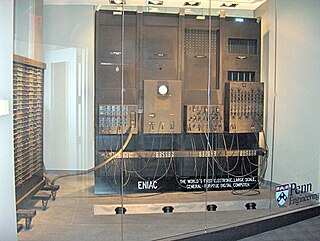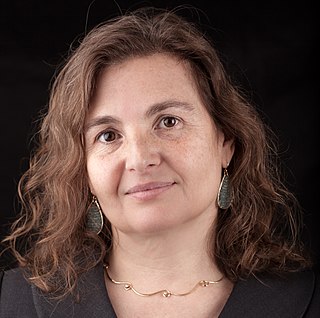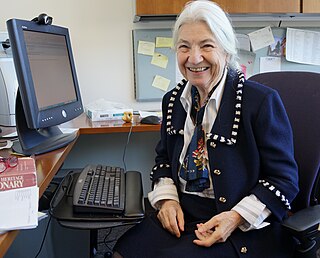Related Research Articles

Sir Charles Antony Richard Hoarehor is a British computer scientist who has made foundational contributions to programming languages, algorithms, operating systems, formal verification, and concurrent computing. His work earned him the Turing Award, usually regarded as the highest distinction in computer science, in 1980.

ENIAC was the first programmable, electronic, general-purpose digital computer, completed in 1945. Other computers had some of these features, but ENIAC was the first to have them all. It was Turing-complete and able to solve "a large class of numerical problems" through reprogramming.

Butler W. Lampson FRS is an American computer scientist best known for his contributions to the development and implementation of distributed personal computing.

Adele Goldberg is an American computer scientist. She was one of the co-developers of the programming language Smalltalk-80, which is a computer software that simplifies the programming language, and has been the basis of knowledge and structure for many other programming languages such as Python, C, and Java. She also developed many concepts related to object-oriented programming while a researcher at the Xerox Palo Alto Research Center (PARC), in the 1970s.

Robert Elliot Kahn is an American electrical engineer who, along with Vint Cerf, first proposed the Transmission Control Protocol (TCP) and the Internet Protocol (IP), the fundamental communication protocols at the heart of the Internet.

Sir Maurice Vincent Wilkes was an English computer scientist who designed and helped build the Electronic Delay Storage Automatic Calculator (EDSAC), one of the earliest stored program computers, and who invented microprogramming, a method for using stored-program logic to operate the control unit of a central processing unit's circuits. At the time of his death, Wilkes was an Emeritus Professor at the University of Cambridge.

Lynn Ann Conway is an American computer scientist, electrical engineer and transgender activist.

Barbara Liskov is an American computer scientist who has made pioneering contributions to programming languages and distributed computing. Her notable work includes the introduction of abstract data types and the accompanying principle of data abstraction, along with the Liskov substitution principle, which applies these ideas to object-oriented programming, subtyping, and inheritance. Her work was recognized with the 2008 Turing Award, the highest distinction in computer science.
Jean E. Sammet was an American computer scientist who developed the FORMAC programming language in 1962. She was also one of the developers of the influential COBOL programming language.

Frances Elizabeth Holberton was an American computer scientist who was one of the six original programmers of the first general-purpose electronic digital computer, ENIAC. The other five ENIAC programmers were Jean Bartik, Ruth Teitelbaum, Kathleen Antonelli, Marlyn Meltzer, and Frances Spence.

Jean Bartik was one of the original six programmers of the ENIAC computer.

Karen Ida Boalth Spärck Jones was a self-taught programmer and a pioneering British computer scientist responsible for the concept of inverse document frequency (IDF), a technology that underlies most modern search engines. She was an advocate for women in computer science, her slogan being, "Computing is too important to be left to men." In 2019, The New York Times published her belated obituary in its series Overlooked, calling her "a pioneer of computer science for work combining statistics and linguistics, and an advocate for women in the field." From 2008, to recognize her achievements in the fields of information retrieval (IR) and natural language processing (NLP), the Karen Spärck Jones Award is awarded to a new recipient with outstanding research in one or both of her fields.

Daniela L. Rus is a roboticist and computer scientist, Director of the MIT Computer Science and Artificial Intelligence Laboratory (CSAIL), and the Andrew and Erna Viterbi Professor in the Department of Electrical Engineering and Computer Science (EECS) at the Massachusetts Institute of Technology. She is the author of the books Computing the Future and The Heart and the Chip.

Ruzena Bajcsy is an American engineer and computer scientist who specializes in robotics. She is professor of electrical engineering and computer sciences at the University of California, Berkeley, where she is also director emerita of CITRIS.
Fred Barry Schneider is an American computer scientist, based at Cornell University, where he is the Samuel B. Eckert Professor of Computer Science. He has published in numerous areas including science policy, cybersecurity, and distributed systems. His research is in the area of concurrent and distributed systems for high-integrity and mission-critical applications.
Judith A. Clapp is a computer scientist who began her career at the Massachusetts Institute of Technology (MIT) and subsequently moved to the Lincoln Laboratory and then to MITRE, where she was a leader in the Semi-Automatic Ground Environment (SAGE) military project, including the development of the SAGE computer.
Hilary J. Kahn (1943–2007) was a South African British computer scientist who spent most of her career as a professor at the University of Manchester, where she worked on computer-aided design and information modelling. Kahn participated in the development of the Manchester MU5 computer. Later she became involved in standards development and was both the chair of the Technical Experts Group and a member of the Steering Committee for the development of the EDIF standard. Kahn retired from Manchester in 2006 and died in 2007.
Ann Hardy was an American computer programmer and entrepreneur, best known for her pioneering work on computer time-sharing systems while working at Tymshare from 1966 onwards.
Lynne Edwards Parker is Associate Vice Chancellor and Director of the AI Tennessee Initiative at the University of Tennessee. Previously, she was Deputy United States Chief Technology Officer and Founding Director of the National Artificial Intelligence Initiative Office at the United States' White House Office of Science and Technology Policy. She is an American roboticist specializing in multi-robot systems, swarm robotics, and distributed artificial intelligence.
References
- 1 2 3 "Opera Group > People". University of Cambridge Computer Laboratory. Retrieved 18 August 2015.
- 1 2 3 4 "Jean Bacon (personal web page)" . Retrieved 18 August 2015.
- 1 2 3 4 Bacon, Jean (10 April 2001). "Oral History: Jean Bacon". IEEE History Center Oral History Program (Interview). Interviewed by Janet Abbate. Cambridge, United Kingdom.
- 1 2 "Professor Jean Bacon awarded Honorary Degree of Doctor of the University". The Open University Centre for Research in Computing. Retrieved 20 August 2015.
- ↑ "Distributed Systems Online, IEEE". IEEE Xplore. Retrieved 20 August 2015.